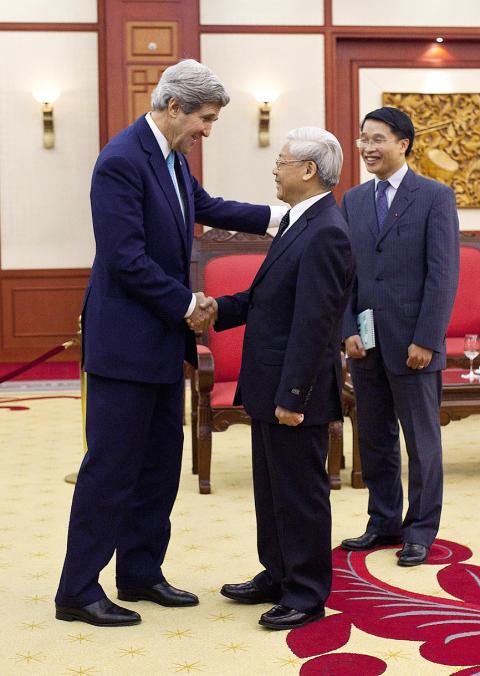Taking clear aim at China’s growing aggressiveness in territorial disputes with its smaller neighbors, US Secretary of State John Kerry yesterday announced that Washington would boost maritime security assistance to Southeast Asian countries amid rising tensions with Beijing.
On his first visit to Vietnam as the US’ top diplomat, Kerry pledged an additional US$32.5 million for ASEAN members to protect their territorial waters and navigational freedom in the South China Sea, where four states have competing claims with China. Included in the new aid is up to US$18 million for Vietnam alone that will include five fast patrol boats for its coast guard.
With the new contribution, US maritime security assistance to the region will exceed US$156 million over the next two years, he said.

Photo: Reuters
Kerry said the new assistance was not a “quickly conceived reaction to any events in the region,” but rather a “gradual and deliberate expansion” of US support as part of US President Barack Obama’s administration’s broader decision to refocus attention on the Asia-Pacific region.
However, his comments came as Washington and Beijing trade barbs over a near collision between US and Chinese naval vessels in the South China Sea on Dec. 5.
China announced late last month that it was establishing a defense zone over the East China Sea, a maritime area between China, Taiwan, South Korea and Japan. All aircraft entering the zone must notify Chinese authorities beforehand, and China would take unspecified defensive measures against those that do not comply.
Neighboring countries and the US have said they will not honor the new zone — believed to be aimed at claiming disputed territory — and have said it unnecessarily raises tensions.
Already, China has claimed it has a sovereign right to establish a similar zone over the South China Sea, where China and the Philippines are locked in another long-running territorial dispute.
“Peace and stability in the South China Sea is a top priority for us and for countries in the region,” Kerry told reporters at a news conference with Vietnamese Foreign Minister Pham Binh Minh. “We are very concerned by and strongly opposed to coercive and aggressive tactics to advance territorial claims.”
While stressing US neutrality on the competing sovereignty claims, Kerry called on China and ASEAN to quickly agree to a binding code of conduct for the South China Sea and to resolve their disputes peacefully through negotiations.
China’s increasing assertiveness in the region — including the establishment of the East China Sea air defense zone — has alarmed many of the 10 ASEAN members , including Vietnam and the Philippines, which Kerry will visit today.
In addition, Kerry made clear that the aid is designed to help Southeast Asian nations defend their waters from encroachment and his announcement was accompanied by blunt criticism of China for its creation of a new air defense zone and suggestions that it might do the same in the South China Sea.
As such, it is almost certain to anger Beijing, which bristles at what it sees as US interference in areas China considers to be in its “core interest.”

‘FORM OF PROTEST’: The German Institute Taipei said it was ‘shocked’ to see Nazi symbolism used in connection with political aims as it condemned the incident Sung Chien-liang (宋建樑), who led efforts to recall Democratic Progressive Party (DPP) Legislator Lee Kun-cheng (李坤城), was released on bail of NT$80,000 yesterday amid an outcry over a Nazi armband he wore to questioning the night before. Sung arrived at the New Taipei City District Prosecutors’ Office for questioning in a recall petition forgery case on Tuesday night wearing a red armband bearing a swastika, carrying a copy of Adolf Hitler’s Mein Kampf and giving a Nazi salute. Sung left the building at 1:15am without the armband and apparently covering the book with a coat. This is a serious international scandal and Chinese

A US Marine Corps regiment equipped with Naval Strike Missiles (NSM) is set to participate in the upcoming Balikatan 25 exercise in the Luzon Strait, marking the system’s first-ever deployment in the Philippines. US and Philippine officials have separately confirmed that the Navy Marine Expeditionary Ship Interdiction System (NMESIS) — the mobile launch platform for the Naval Strike Missile — would take part in the joint exercise. The missiles are being deployed to “a strategic first island chain chokepoint” in the waters between Taiwan proper and the Philippines, US-based Naval News reported. “The Luzon Strait and Bashi Channel represent a critical access

COUNTERINTELLIGENCE TRAINING: The ministry said 87.5 percent of the apprehended Chinese agents were reported by service members they tried to lure into becoming spies Taiwanese organized crime, illegal money lenders, temples and civic groups are complicit in Beijing’s infiltration of the armed forces, the Ministry of National Defense (MND) said in a report yesterday. Retired service members who had been turned to Beijing’s cause mainly relied on those channels to infiltrate the Taiwanese military, according to the report to be submitted to lawmakers ahead of tomorrow’s hearing on Chinese espionage in the military. Chinese intelligence typically used blackmail, Internet-based communications, bribery or debts to loan sharks to leverage active service personnel to do its bidding, it said. China’s main goals are to collect intelligence, and develop a

PERSONAL DATA: The implicated KMT members allegedly compiled their petitions by copying names from party lists without the consent of the people concerned Judicial authorities searched six locations yesterday and questioned six people, including one elderly Chinese Nationalist Party (KMT) member and five KMT Youth League associates, about alleged signature forgery and fraud relating to their recall efforts against two Democratic Progressive Party (DPP) legislators. After launching a probe into alleged signature forgery and related fraud in the KMT’s recall effort, prosecutors received a number of complaints, including about one petition that had 1,748 signatures of voters whose family members said they had already passed away, and also voters who said they did not approve the use of their name, Taipei Deputy Chief Prosecutor